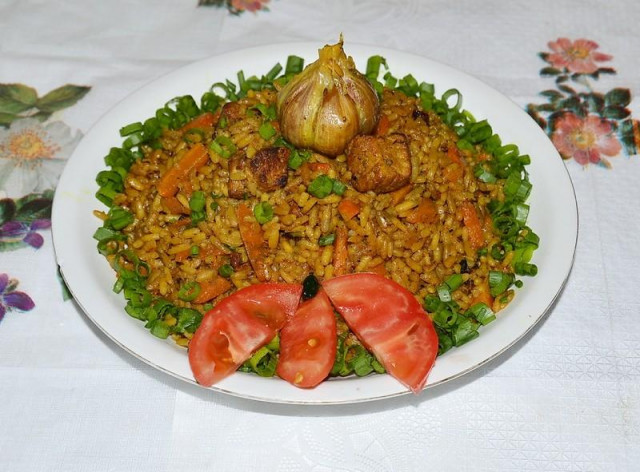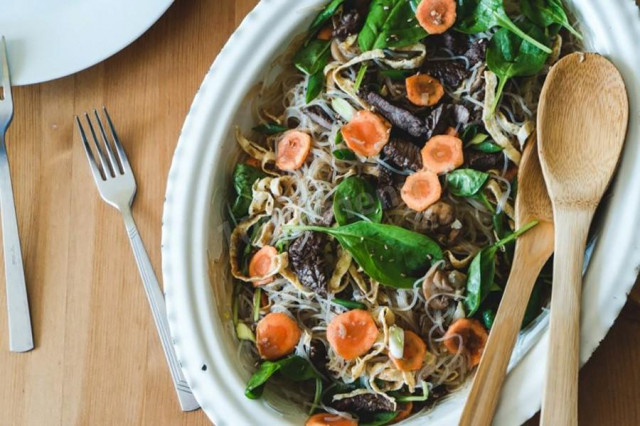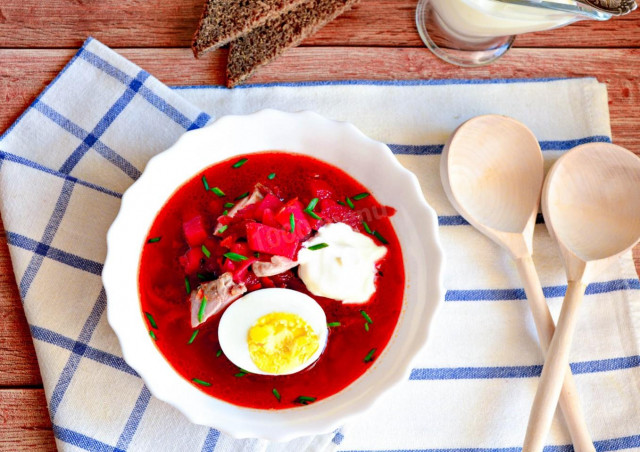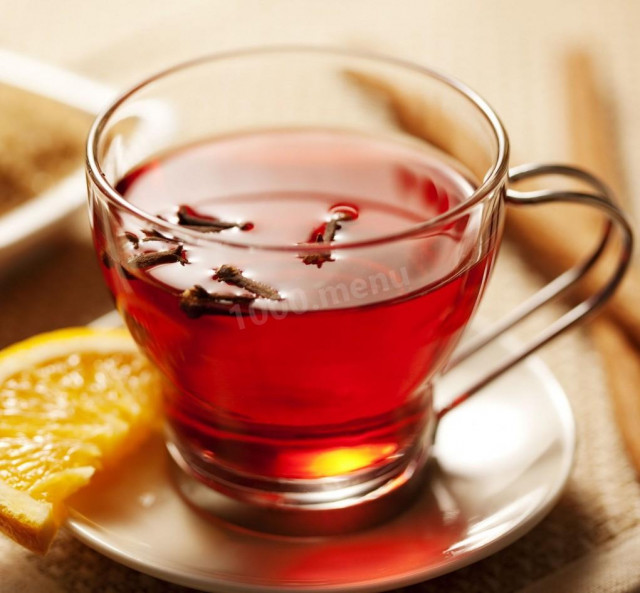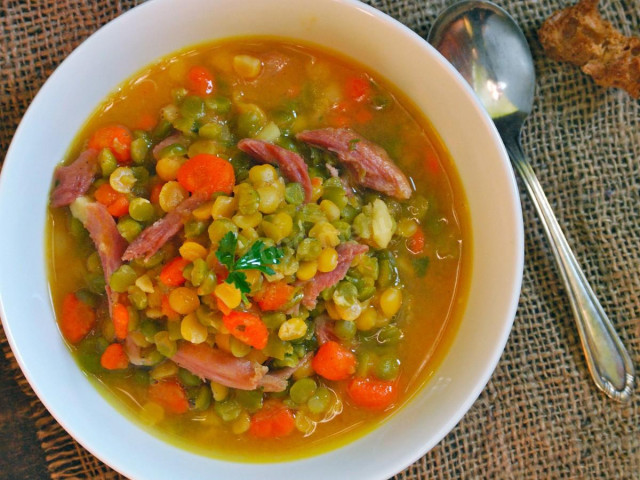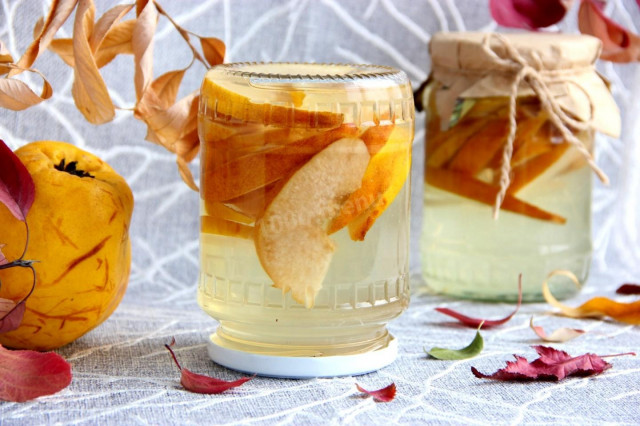Composition / ingredients
Step-by-step cooking
Step 1:
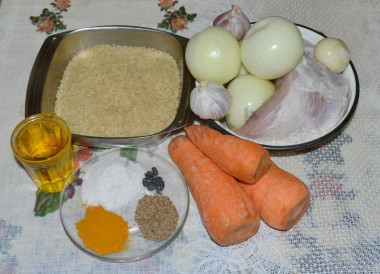
Products necessary for cooking pilaf. Onions and carrots need to be cleaned, thoroughly wash these vegetables and meat. At the garlic heads, remove several layers of husk, and without disassembling into cloves, wash the heads under running water.
Step 2:
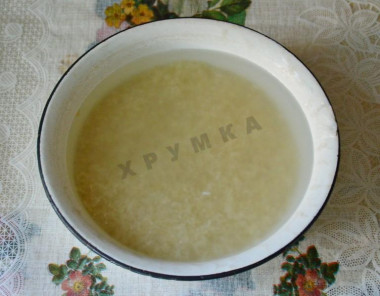
Rice should be rinsed before slicing vegetables, carefully rubbing it in water with your hand. Change the water at least 5 times and leave the rice in the water.
Step 3:

Cut the meat into large cubes.
Step 4:
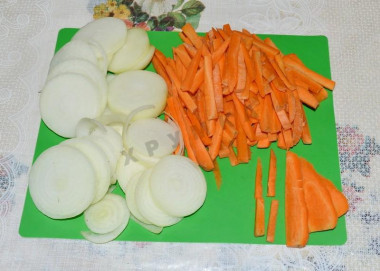
Chop vegetables coarsely: onion rings 0.5-0.8 cm, carrot - strips 0.5-0.8 cm thick, 4-5 cm long.
Step 5:
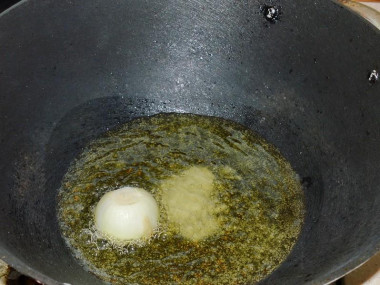
Pour vegetable oil into the cauldron, put it on maximum heat, add 0.5 tablespoons of salt, lower a small peeled onion.
Step 6:
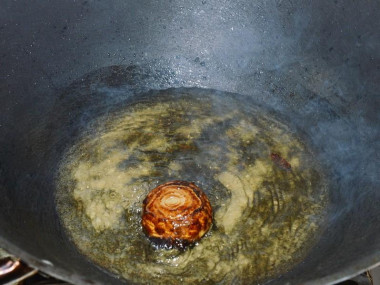
Stirring, fry the onion until golden brown. This is a sign that the oil has warmed up. For stirring, we use a slotted spoon. We take out the onion, we won't need it anymore.
Step 7:

Add the meat, stir intensively for the first few seconds to prevent it from sticking to the walls of the cauldron. Rub 1/3 of cumin in the palms and add it to the meat. Fry the meat on maximum heat for 15-20 minutes, stirring occasionally, until the water evaporates and a golden crust forms.
Step 8:
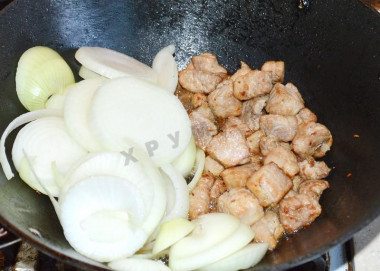
Without reducing the heat, add the onion. Stirring occasionally, fry it until soft for about 15 minutes.
Step 9:
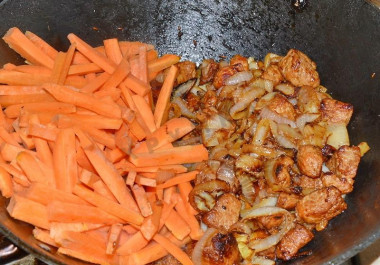
Without reducing the heat, put carrots in a cauldron with meat and onions and fry it, stirring, for 10 minutes until soft (when pressing the edge of the skimmer on a piece of carrot, we can easily divide it).
Step 10:
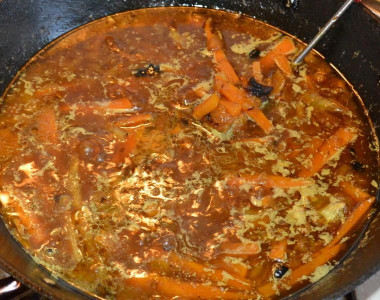
Fill everything with hot water so that it covers the roast. You can use boiling water to save time. Add the remaining cumin, salt and barberry. From the moment of boiling the roast, simmer everything on high heat for about 10 minutes, stirring occasionally. At the end, add turmeric. In a place where water boils intensely, you need to taste it - it should be salty.
Step 11:
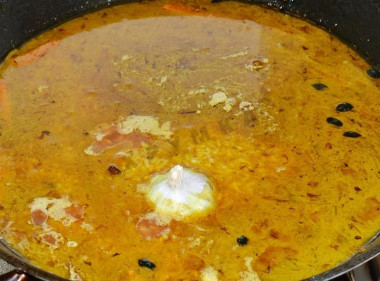
Turn down the fire to the minimum. We spread the rice, distributing it evenly over the frying. Do not mix! We spread the garlic heads on the surface of the rice and crush them with a slotted spoon into the rice. The water should cover the rice by 1.5 cm. If the water level is lower, add boiling water, substituting a skimmer under the stream (so as not to break the rice layer). Increase the heat to maximum and cook until the water evaporates from the surface of the rice.
Step 12:
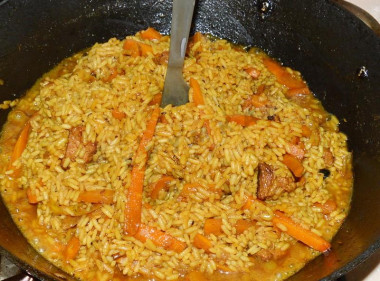
Then reduce the heat to a minimum and form a hill of rice. We make holes in it with a knife in a circle and in the center to the bottom in order to evaporate excess water. Close the lid and let the rice evaporate for about 15 minutes.
Step 13:
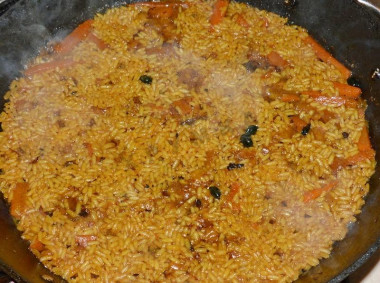
Turn off the fire. If there is a desire and time, then let the pilaf brew under the lid for 10 minutes. That's it, the pilaf is ready, help yourself!
There are several ways to serve pilaf.
The first option is to mix the contents of the cauldron, put it on a dish in the form of a slide, decorate with garlic and herbs.
The second option is to take rice into one container, and pieces of meat from frying into another. After mixing the rice with the remaining roast, form a hill of rice on a platter, putting pieces of meat on top of it. Garnish with herbs, garlic.
Keep in mind that the final result in this dish also depends on how you chop the carrots: grated carrots will turn into mush during heat treatment and mix evenly with the rest of the ingredients, cut into strips or cubes will retain their shape.
Use oil with a high smoking temperature for frying! Any oils are useful only until a certain temperature is reached - the point of smoking, at which the oil begins to burn and toxic substances, including carcinogens, are formed in it.
Unrefined oils, with rare exceptions, have a low smoking point. There are a lot of unfiltered organic particles in them, which quickly begin to burn.
Refined oils are more resistant to heating, and their smoking point is higher. If you are going to cook food in the oven, on a frying pan or grill, make sure that you use oil with a high smoking point. The most common of the oils with a high smoking point: refined varieties of sunflower, olive and grape.
Caloric content of the products possible in the composition of the dish
- Onion - 41 kcal/100g
- Pork fat - 333 kcal/100g
- Pork meat - 357 kcal/100g
- Pork - low-fat roast - 184 kcal/100g
- Pork chop on a bone - 537 kcal/100g
- Pork - schnitzel - 352 kcal/100g
- Pork shoulder - 593 kcal/100g
- Boar's leg - 113 kcal/100g
- Pork - 259 kcal/100g
- Raw wild rice - 353 kcal/100g
- Brown raw rice - 360 kcal/100g
- Boiled brown rice - 119 kcal/100g
- White fortified raw rice - 363 kcal/100g
- Fortified boiled white rice - 109 kcal/100g
- White rice, steamed, with long grains raw - 369 kcal/100g
- Steamed white rice, boiled with long grains - 106 kcal/100g
- Instant dry rice - 374 kcal/100g
- Instant rice, ready to eat - 109 kcal/100g
- Fig - 344 kcal/100g
- Carrots - 33 kcal/100g
- Dried carrots - 275 kcal/100g
- Boiled carrots - 25 kcal/100g
- Garlic - 143 kcal/100g
- Turmeric - 325 kcal/100g
- Zira - 112 kcal/100g
- Vegetable oil - 873 kcal/100g
- Barberry - 29 kcal/100g
- Salt - 0 kcal/100g

